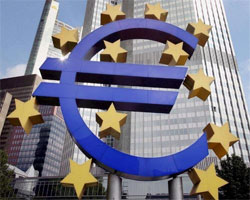While the currencies of the various nations are all valid for purchasing goods and services, it is now becoming a popular form of investment to exchange one national currency for another; and in fact, the currency market has been booming at least since the 1970s, when many restrictions on international trade were lifted or modified. The currencies of wealthy, developed nations are naturally the most commonly traded ones; they included the American and Australian dollars, the British pound, the Japanese yen, and—since it was adopted by most of the nations of Europe ten years ago—the euro.
Transactions Take Place on a Global Scale
This relatively new market is very different from all others in a number of ways. The most obvious, of course, is the fact that its transactions take place on a global scale. Then there is the sheer volume of its assets, and the high level of liquidity that results; the continuousness of its operations (only on weekends do they cease); and, more important, the number and variety of factors that can cause the exchange rates to fluctuate, the low profit margins, and the leverage whereby these margins may be enhanced.

People who invest in the foreign exchange market are performing an invaluable service to the economies of many countries. They make it possible for businesses in different nations to exchange goods with each other. They also encourage others to speculate on foreign currencies. Such speculation has been shown to have a stabilizing effect on the forex market.
Different Currencies Have Their Own Interest Rates
The savvy forex investor knows very well that the various currencies in which he trades all have their own rates of interest, and can easily capitalize on those differences. By taking out a loan in a low interest currency, and using the money to purchase another whose interest rate is significantly higher, and uses high leverage, he can make a huge fortune—or suffer a huge financial loss. This form of forex trading, known as carry trade, must therefore be conducted with the greatest degree of caution.
The monetary values of the currencies of many of the economically less strong countries are pegged to those of the more powerful ones, so that as one changes, so do the others. For example, many African nations have their currencies pegged to the euro. Other countries have “floating currencies.”
In the so- called Eurozone, things are not going so smoothly. Even before the general elections held in Greece on June 9 and 10 of this year took place, it was clear to everyone, both inside and outside the country, that this event could spell a huge difference in the value of the euro—indeed, they could determine its “very future.”
Problems Facing the EuroZone
 But Greece is not the only problem facing the Eurozone this year. Spain has been sinking ever more deeply into debt, and the level at which the country has been borrowing is more than the Spanish people can sustain. They are effectively calling out for external assistance, according to Bank of Tokyo- Mitsubishi strategist Derek Halpenny.
But Greece is not the only problem facing the Eurozone this year. Spain has been sinking ever more deeply into debt, and the level at which the country has been borrowing is more than the Spanish people can sustain. They are effectively calling out for external assistance, according to Bank of Tokyo- Mitsubishi strategist Derek Halpenny.
Spain does have plans to get out of this situation: Most notably, the country’s banking conglomerate, Bankia—which was formed two years ago through the merger of seven regional savings banks—has requested a bailout worth of €19 billion, the largest such request in Spanish history. This plan, the national government hopes, will assure forex investors that Spain is sufficiently stable and healthy financially for them to consider her as a potential market for their funds. However, Bankia has also had its Standard & Poor credit rating reduced below investment grade, so it is now a high yield debt or “junk bond.”
Regarding minor currencies, the Nigerian naira has decreased slightly in value against the US dollar, as a result of a drop in the volume of the greenback in the system.
Guest Author Contribution: This article was supplied by Exchange Currency, a site that specialises in helping its users save money by comparing the best rates on the market. It also teaches people about currency in its education centre and offers afriendly forum where people can ask questions.
If you would like to gain more valuable financial insight into global markets then make sure that you sign-up for one of the discounted Wall Street Journal subscriptions on offer on our homepage.
